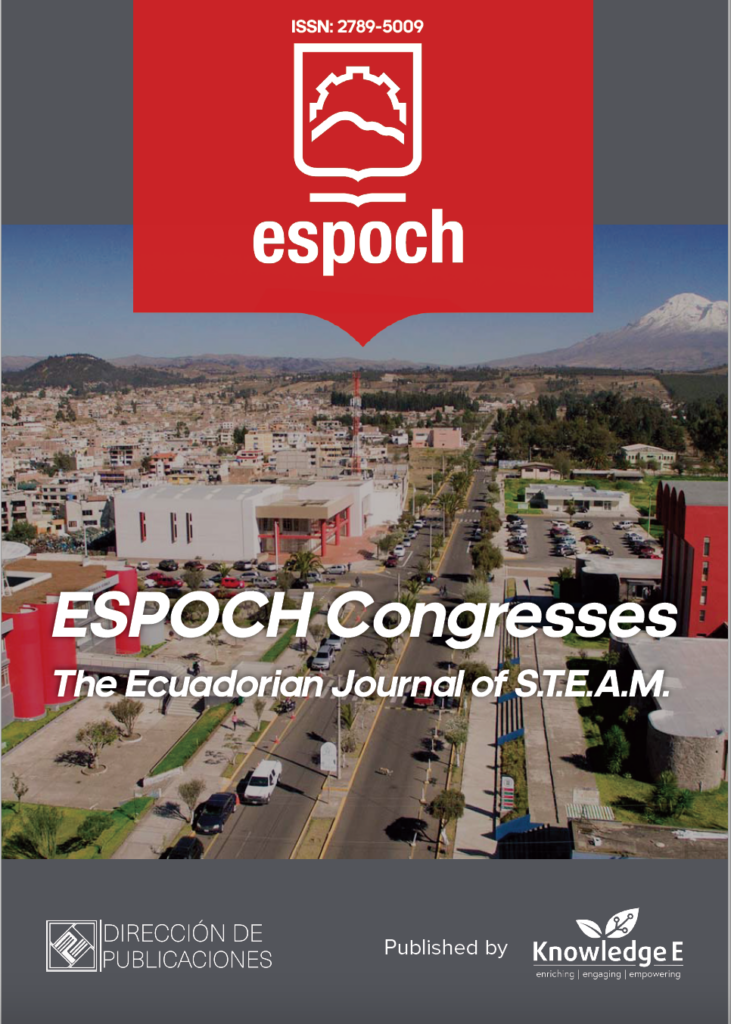
ESPOCH Congresses: The Ecuadorian Journal of S.T.E.A.M.
ISSN: 2789-5009
Leading Ecuadorian research in science, technology, engineering, arts, and mathematics.
HTLV I/II Infection from Blood Donors of GUAYAQUIL – ECUADOR
Published date:Aug 09 2022
Journal Title: ESPOCH Congresses: The Ecuadorian Journal of S.T.E.A.M.
Issue title: Volume 2, Issue 3
Pages:941 - 951
Authors:
Abstract:
Background: There are two linfo tropic human virus. The HTLV-1 causes the myelopathy which is linked with the HTLV-1 o Tropical spastic paraparesis (TSP) and Adult T-cell leukemia/lymphoma (ATL or ATLL). Therefore, the HTLV-2 has been related with neurological symptoms similar to the TSP. In Ecuador, there are not updated statistics about HTLV I/II infection.
Objective: To determine the seroprevalence of HTLV I/II infection in blood donors who attended to the blood bank in the ”Teodoro Maldonado Carbo” Hospital from Guayaquil, Ecuador, from April 2017 to December 2018.
Materials and methods: The population were twenty-three thousand one hundred ninetyfive (23 195) blood donors. The HTLV I/II antibody detection was done through the Chemiluminescence immunoassay (CLIA) technique.
Results: From 23 195 blood donors, 0.73% (n = 170) had a reactive or positive result for HTLV I/II antibodies. The 72% of donors (n=122) with a positive result were males and 28% (n = 48) were women. The average age of donors with a positive test result was 40 ± 21 years old. From the 170 reactive donors, 97 (57%) were employed, 51 were unemployed, 16 were farmers end 6 were students. From de full positive result donors, the 87% (n=148) lived in Guayaquil and 22 lived in another cities of Ecuador Conclusions: The seroprevalence of HTLV I/II infection in blood donors who participated in the research at ”Teodoro Maldonado Carbo” Hospital in Guayaquil, is 0.73% (n = 170); it means that for every 137 donors, one has reactive or positive test result. It confirms the importance of preventing the disease transmission through transfused blood.
Keywords: HTLV I/II, blood donors
References:
[1] Greenwood, D., Slack, R. C. B., Barer, M. R., & Irving, W. L. (2012). Medical Microbiology: A Guide to Microbial Infections: Pathogenesis, Immunity, Laboratory Diagnosis and Control. (18th ed., p. 672). EEUU: Elsevier Health Sciences. Retrieved from http://books.google.com/books?id=eeuDjsA66CAC&pgis=1
[2] Alarcón-Avilés, T., & Alarcón-Guzmán, T. (1990). Infección Neurológica por HTLV-I. Sociedad de Neurología Ecuatoriana. Retrieved from http://www.medicosecuador. com/revecuatneurol/vol10_n3_2001/infeccion_neurologica_por_htlv.htm?tag= stupides-21
[3] Alarcón-Avilés, T., Alarcón-Guzmán, T., & Román, G. (1993). Retrovirus. Retrieved October 02, 2013, from http://www.medicosecuador.com/espanol/articulos_medicos/178.htm
[4] Gallo, R. (2005). History of the discoveries of the first human retroviruses: HTLV-1 and HTLV-2. Oncogene, 24, 5. Retrieved from http://www.nature.com/onc/journal/v24/n39/pdf/1208980a.pdf
[5] Mahieux, R., & Gessain, A. (2009). The human HTLV-3 and HTLV-4 retroviruses: New members of the HTLV family. Pathologie Biologie, 57(2), 161–166. Retrieved from http://www.sciencedirect.com/science/article/pii/S0369811408000394
[6] Gotuzzo Herencia, E., González Lagos, E., Verdonck Bosteels, K., Mayer Arispe, E., Ita Nagy, F., & Clark Leza, D. (2010). Veinte años de investigación sobre HTLV-1 y sus complicaciones médicas en el Perú: Perspectivas generales. Acta Médica Peruana, 27(3), 196–203. Retrieved from http://www.scielo.org.pe/scielo.php?script=sci_arttext&pid=S1728- 59172010000300008&lng=es&nrm=iso&tlng=es
[7] Biglione Mirna, B. C. (2013). Aportes y consideraciones sobre la infección por los virus linfotrópicos humanos T Humanos tipo 1 y 2 en Argentina. Rev Argent Salud Publica, 4, 32–37. Retrieved from http://www.saludinvestiga.org.ar/rasp/articulos/volumen14/32-37.pdf
[8] Saito, M. (2010). Immunogenetics and the Pathological Mechanisms of Human T-Cell Leukemia Virus Type 1- (HTLV-1) Associated Myelopathy/Tropical Spastic Paraparesis (HAM/TSP). Interdisciplinary Perspectives on Infectious Diseases, 2010, 478461. doi:10.1155/2010/478461
[9] Bennett, J., & Dolin, R. (2016). Mandell, Douglas y Bennet Enfermedades infecciosas. Principios y práctica. Elsevier Ed. 7ma ed. España.
[10] Saito, M., & Bangham, C. (2012). Immunopathogenesis of Human T-Cell Leukemia Virus Type-1- Associated Myelopathy/Tropical Spastic Paraparesis: Recent Perspectives. Leukemia Research and Treatment. Retrieved from file:///C:/Users/Cumita/Downloads/Immunopathogenesis of Human T-Cell Leukemia Virus Type-1-Associated Myelopathy Tropical Spastic Paraparesis Recent Perspectives. pdf
[11] Berini, Carolina Andrea. (2010). Virus linfotrópico T-humano tipo 1 y 2 (HTLV-1/2): optimización del diagnóstico y epidemiología molecular en distintas poblaciones de Argentina. Facultad de Ciencias Exactas y Naturales. Universidad de Buenos Aires.
[12] Mendoza-Suarez, G. E. (2011). Paraparesia Espástica Tropical Pdf free ebook download. Rev Soc Peru Med Interna, 24 (4), 170–176. Retrieved from http://ebookbrowsee.net/paraparesiaespastica-tropical-pdf-d587151882
[13] Osame M, Matsumoto M, Usuku K, et al. Chronic progressive myelopathy associated with elevated antibodies to human T-lymphotropic virus type I and adult T-cell leukemialike cells. Ann Neurol. 1987; 21:117-122.
[14] Gessain A, Gout O. Chronic myelopathy associated with human T-lymphotropic virus type I (HTLV-I). Ann Intern Med. 1992; 117:933-946.
[15] Roman GC, Roman LN. Tropical spastic paraparesis: a clinical study of 50 patients from Tumaco (Colombia) and review of the worldwide features of the syndrome. J Neurol
[16] Sci. 1988; 87:121-138.
[17] Araujo AQ, Silva MT. The HTLV-1 neurological complex. Lancet Neurol. 2006;5 (12):1068-1076.
[18] Centers for Disease Control and Prevention. Licensure of screening tests for antibody to human T-lymphotropic virus type I. MMWR Morb Mortal Wkly Rep. 1988; 37:736- 747.
[19] Madeleine MM, Wiktor SZ, Goedert JJ, et al. HTLV-I and HTLV-II world-wide distribution: reanalysis of 4,832 immunoblot results. Int J Cancer. 1993; 54:255-260.
[20] Roberts BD, Foung SK, Lipka JJ, et al. Evaluation of an immunoblot assay for serological confirmation and differentiation of human T-cell lymphotropic virus types I and II. J Clin Microbiol. 1993; 31:260-264.